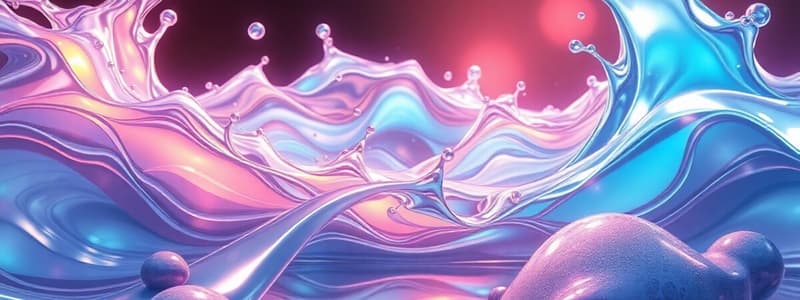Podcast
Questions and Answers
What effect does an increase in temperature generally have on the viscosity of a liquid?
What effect does an increase in temperature generally have on the viscosity of a liquid?
- Increases viscosity
- Decreases viscosity (correct)
- Causes viscosity to fluctuate unpredictably
- Has no effect on viscosity
How does the strength of attractive forces in a liquid relate to its vapor pressure?
How does the strength of attractive forces in a liquid relate to its vapor pressure?
- Stronger forces result in a lower vapor pressure (correct)
- Stronger forces result in a higher vapor pressure
- Weaker forces result in a lower vapor pressure
- Vapor pressure is unaffected by attractive forces
What causes surface tension in liquids?
What causes surface tension in liquids?
- The temperature of the liquid
- Attraction between interior and exterior molecules (correct)
- The density of the liquid
- Molecular weight of the liquid
What happens when the vapor pressure of a liquid equals atmospheric pressure?
What happens when the vapor pressure of a liquid equals atmospheric pressure?
What is the relationship between the boiling point of a liquid and its attractive forces?
What is the relationship between the boiling point of a liquid and its attractive forces?
Flashcards
Viscosity
Viscosity
The resistance to flow in a liquid, influenced by molecular friction and attractive forces.
Surface Tension
Surface Tension
The force of attraction between molecules at the surface of a liquid, causing phenomena like droplet formation.
Vapor Pressure
Vapor Pressure
The pressure exerted by gas above a liquid in equilibrium with its vapor; increases with temperature.
Effect of Temperature on Viscosity
Effect of Temperature on Viscosity
Signup and view all the flashcards
Effect of Temperature on Surface Tension
Effect of Temperature on Surface Tension
Signup and view all the flashcards
Study Notes
Liquid Properties
- Liquids have attractive forces that allow particles to stay close but allows free movement.
- Particles' energy doesn't overcome attractive forces completely to escape.
- Boiling point depends on the strength of attractive forces.
Viscosity
- Viscosity measures a liquid's resistance to flow.
- Viscosity is caused by friction between moving molecules.
- Higher attractive forces result in higher viscosity.
- Higher temperatures cause lower viscosity.
Surface Tension
- Surface tension is the attraction between liquid surface molecules.
- Surface tension creates droplets, capillary action, and allows certain insects to walk on water.
- Higher attractive forces result in higher surface tension.
- Higher temperatures cause lower surface tension.
Vapor Pressure
- Vapor pressure is the gas pressure above a liquid in a closed system when evaporation and condensation balance.
- All liquids evaporate as particles escape the surface.
- Higher temperatures result in higher vapor pressure.
- Boiling occurs when vapor pressure equals atmospheric pressure.
- Higher attractive forces result in lower vapor pressure at any given temperature and higher boiling point.
Studying That Suits You
Use AI to generate personalized quizzes and flashcards to suit your learning preferences.




